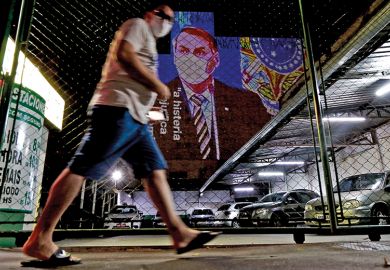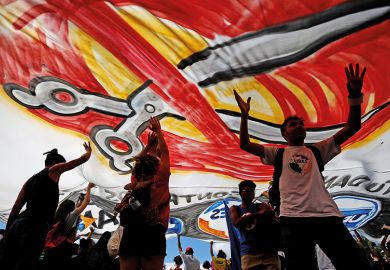Brazilian universities are struggling to provide online teaching as they battle budget cuts and a government in denial about the scale of the coronavirus pandemic.
According to the Ministry of Education, 38 of Brazil’s 69 state universities have suspended their activities entirely, while 21 are teaching remotely and 12 are partially open. The ministry estimates that, of the more than 1.1 million students attending federal institutions, about half have had their learning suspended.
The figures emerged as the spread of Covid-19 showed little sign of easing – at the beginning of August, Brazil’s death toll passed 100,000.
Academics told Times Higher Education that the shift to online tuition had been hampered by lack of access to computer and internet connections among the country’s poorest students. There was no nationwide plan to support the transition, and states had been left to make their own decisions, explained Adriana Marotti de Mello, professor of business at the University of São Paulo (USP).
“[USP has] many students, about 30 per cent, from low-income families. Some have problems with adequate space for studying, and we are hearing many reports of anxiety and other mental health issues,” she said. “There is no integrated plan to train professors in online teaching…learning is being jeopardised.”
However, USP has worked hard to get online, even offering high-speed internet plans to low-income students, Professor Marotti de Mello said.
Marcelo Knobel, rector of the University of Campinas, said his institution was also teaching remotely and was trying to help mitigate some of these issues by, for example, providing poorer students with Sim cards to access the internet. “The problem is the government is in denial about the pandemic, and we have to fight against the political atmosphere,” he said.
President Jair Bolsonaro has repeatedly downplayed the destruction caused by the virus and has refused to enact protective measures that would harm the economy.
Yet universities are still feeling the financial impact. The budget for federal institutions, which had been falling year-on-year since Mr Bolsonaro’s election, has already been cut by R$1.4 billion (£200 million) for 2021, but the squeeze is expected to last much longer.
Private institutions were also reporting high levels of student dropout and financial losses. At the end of Brazil’s first academic term in June, many private institutions fired professors to cut costs.
State institutions do not have the power to make redundancies in this way, but they have postponed wage increases and implemented hiring freezes.
“We are facing a severe financial crisis. It’s going to have a big impact in operations,” Professor Knobel said. Unicamp was facing the equivalent of £45 million in cuts, he said.
There has been some almost positive news for universities: after a troubled period in office, Abraham Weintraub resigned from his post as education minister in June.
Mr Weintraub had been criticised for attempting to interfere with universities through a decree allowing him to choose university rectors and for bidding to end campus lockdowns early. He had also come under fire for a racist tweet about China.
He was immediately replaced by Carlos Decotelli, who stayed less than a week in office because it was revealed that he had lied about his qualifications. The current education minister is Milton Ribeiro, a Presbyterian pastor.
Mr Ribeiro does not appear to want to interfere with university autonomy – for now – in the same way as Mr Weintraub had, Professor Knobel said. “At the moment, our main priority is the safety of our students and staff. It’s a lot of responsibility,” he said.
Register to continue
Why register?
- Registration is free and only takes a moment
- Once registered, you can read 3 articles a month
- Sign up for our newsletter
Subscribe
Or subscribe for unlimited access to:
- Unlimited access to news, views, insights & reviews
- Digital editions
- Digital access to THE’s university and college rankings analysis
Already registered or a current subscriber?








